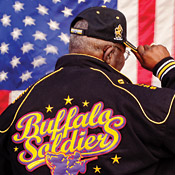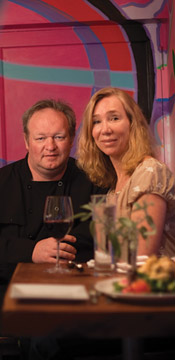Serving Those Who’ve Served
Category: Features

Peter Fedak, LL.B. ’ 65, often invites veterans for some R & R at his farm in Western Maryland, where they can fish, swim, hike and even take in a movie at his private theater; photography: Chris Hartlove
It starts with just two words: “Welcome home.” In those two words is a wealth of meaning—a return to familiar faces and places, hope for a better future, for a chance to live again. When it comes to the ways that we treat our military veterans—how we serve those who have served—those two words can make a big difference.
For several members of the University of Baltimore community, “welcome home” has a new significance, as veterans of the nation’s conflicts in the young century take their place alongside those who fought in earlier wars. It seems that some lessons have been learned about how veterans should be treated, and those lessons in turn are helping today’s veterans truly get back home.
We talked to several UB alumni and University staff about their contributions to improving the lives of former and current members of the military. Whether on or off campus, in or out of class, it’s the kind gestures and human touches that seem to matter most.
Peter Fedak, LL.B. ’65
Willing to make the ultimate sacrifice: Peter Fedak, LL.B. ’65, knows that this is the right way to describe a soldier in a war zone. But this attorney and mentor recognizes that it’s also a good way to describe what people do in everyday life. Whether it’s the busy father who gives up evenings with his kids to pursue a college degree or the single mother who takes on a second job to pay for classes, a sacrifice is made. For Fedak, the acknowledgment of that sacrifice is what’s important. It’s why he started a scholarship for UB law students who've served in Iraq or Afghanistan and why he strives to inspire others to step up and give their all.
Fedak, a Navy veteran, says that many returning vets face having to restart their lives completely. For some, lacking adequate financial resources for college may be just one of a host of issues they encounter. Long-term physical therapy, rocky relationships, friends lost in war—all of it takes a toll on a veteran. Opportunities like law school may lose their appeal, and passionate, talented legal minds may be, well, sacrificed.
“I hate to see a potentially great attorney not get to go to law school—it’s a waste,” Fedak says. “I’m glad to help them. Here they are, coming back from their service, starting out in law school. We need these people.”
The Rockville, Md.-based lawyer built a strong personal-injury practice after his years in the military, which included a stint in the White House during the Eisenhower administration and later as a special agent in naval intelligence. Fedak transferred to UB after completing two years of law school at Georgetown University—and he hasn’t forgotten the hardships of those times.
“I was newly married, working and going to school at night,” he recalls. “I see the same thing with young men and women wrapping up their military service today. They deserve our help.”
Nowadays, Fedak mentors up-and-coming lawyers, especially those who once wore a military uniform. On his wheelchair-accessible farm near Camp David in Thurmont, Md., he also hosts veterans for some much-needed rest and relaxation. The farm gives them a chance to get out of the city and to think about what awaits them in life.

Boosting the self-confidence and job-interviewing skills of veterans is a specialty for Jessi LaCosta, M.A. ’ 97, who has devoted part of her consulting business to this important task; photography: Rob Andrew
Jessi LaCosta, M.A. ’97
Coaching veterans who are readjusting to civilian life and helping them land new jobs or start their own businesses: Jessi LaCosta, M.A. ’97, describes this as a “rewarding, challenging, inspiring, energizing” part of her daily interactions with veterans. Hawk Veteran Solutions, an arm of LaCosta’s BlueRio Strategies consulting firm, pairs her expertise in coaching and personal branding with veterans’ desire to leverage military service when searching for a new career.
Based in San Diego, Calif., LaCosta works with former service members in all stages of their careers. Some served for nearly half their lives while others are barely into their 20s. Many, she says, share a common challenge: They “talk about how they proudly served the mission. ... But in doing that they did not always have the chance to design their own missions—a personal life calling,” she says.
That’s where her plan to launch an online program to certify professionals as “military transition coaches” comes in. She envisions “a cadre of well-trained, strategic and yet compassionate experts” who assist veterans.
LaCosta is gaining insight from employers who could potentially change vets’ lives; her job also entails providing support for managers and small-business owners who want to work with veterans: “I call it helping both sides of the house—helping the transitioning veteran and helping those who hire the veteran.”
The help is often necessary: “To know and believe that the veteran is capable ... and yet for some, the timing is off, the interview does not go well or the job offer was made far below the salary needed. ... It can be painful to see someone who has served our country feel ignored by the community she or he served,” she says.
But with LaCosta’s coaching, her clients show significant gains—specifically, improved confidence and a recapturing of the skills, talents and values they had before they entered the military as well as what they developed while they served.
LaCosta says that if you’re in a position to hire a veteran, you should. They are “incredibly dependable” with “great leadership capabilities” and a sense of loyalty that she calls “intense.” As she points out, they made it their business to save lives, and some of them were in charge of millions of dollars’ worth of equipment and technology.
“The talents and answers are inside the veterans; we just facilitate the uncovering of them—the unveiling of who they get to become in the next chapters of their lives,” LaCosta says.

Bart Stringham, J.D. ’ 81, helps injured vets by teaching them how to play guitar—a way for them to relax and clear their minds while they recover; photography: Chris Hartlove
Bart Stringham, J.D. ’81
Can music truly heal? Bart Stringham, J.D. ’81, is convinced it can. The Washington, D.C.-based attorney who serves as senior vice president and corporate counsel for the National Association of Broadcasters also plays guitar professionally on the side. He believes that wounded veterans can benefit from the fine motor skills required to fashion chords and strum the strings of a guitar as well as from the human interaction that goes along with it. Whether they learn to play well doesn’t matter much to him. It’s the healing that counts.
Stringham says he was watching the news in 2003 when it occurred to him that his love of guitar could serve others’ pressing needs. “I saw a story on returning U.S. soldiers wounded in battles in Iraq and other places,” he says. “It showed them at Walter Reed Hospital—going to the gym, playing pool, reading, hanging out, etc., while recovering from injury. When I saw that they had time on their hands, I knew that some of them would be interested in learning to play guitar.”
It took a while for Stringham to find the right person at Walter Reed Army Medical Center to help him get the practice space and promote his availability for teaching guitar, but once he overcame that hurdle, he began to make musical connections with injured vets.
“I would head to Walter Reed for one evening every week, or every other week,” he says. “After working all day, sometimes I would not be too energetic about giving guitar lessons. But once I got there, I was always glad I made the trip, even if it was just meeting with one interested soldier for a short while.”
Sometimes, a soldier would show up for only one class. Sometimes, he’d get no takers at all. But Stringham never became discouraged because, as he says, “Anyone recovering from a traumatic injury has a lot going on. Playing some guitar now and then would only be a small part of recovery.”
In 2011, Walter Reed closed its doors in Washington and merged with the National Naval Medical Center in Bethesda, Md., to become the Walter Reed National Military Medical Center. Now Stringham is considering volunteering again there.
“I could see working at the new Walter Reed facility,” he says. “They only recently have made the transition, so once they are settled, I will probably get in touch about resuming guitar lessons.”
His reasons for going back are personal: “I had many experiences I will never forget,” he says. “One was giving lessons to a soldier named Heath Calhoun. Heath had lost both legs in battle, but this did not dampen his enthusiasm for learning to play guitar. He was a joy to teach. Heath went on to become a leading athlete, counselor and advocate for injured veterans. Heath qualified to represent the United States as a member of the 2010 U.S. Paralympic Ski Team, and last I heard was training for the 2014 games.
“Another student, John Garrard, was fairly reserved during the lessons we had together, so I was not sure whether he was enjoying them or not. Years later, John reached out to me and told me how important getting together and having those lessons were to him. He gave me one of his medals. I was just unbelievably touched when that happened.”

Some injured veterans need specially built living spaces as they re-enter civilian life, and Karen Colvin, B.A. ’ 95, sees her fully accessible home as a way for them to reach that goal; photography: Chris Hartlove
Karen Colvin, B.A. ’95
What do you do with something you no longer need? Give it away? Sell it? Trash it? When Karen Colvin, B.A. ’95, and her husband, John, decided to move from their uniquely designed home in Owings Mills, Md., they knew exactly what to do with it: Put it in the hands of someone with special needs—specifically, a disabled veteran and his or her family.
Recently retired from teaching sociology at UB, Colvin has used a wheelchair since she was injured in a car accident about 25 years ago. She and John, a builder and developer, custom-designed their ranch house; its wheelchair lift, ramps, counters and other amenities are a model for creating a house that is completely accessible, so much so that it received the governor’s Barrier-Free Design Award in 1983. Now, as the couple enters the next phase of their lives, the house where they raised their children has become a solution waiting to happen.
“We’ve been very blessed, and now we want to see somebody who needs a house like this move in and take comfort in it,” Colvin says. “There are many injured veterans who could use it, and we’re working to make that happen.”
The Colvins’ goal is to find a family through a veterans’ organization with expertise in supporting injured soldiers recuperating in nonclinical settings. Through groups like the Wounded in Action Family Foundation, the couple is making the case that a devastating war injury shouldn’t have a ripple effect that could destabilize a soldier’s house, family, school or job.
“Our house can be a home for a family with special needs,” Colvin says. “There are so many soldiers coming home from Iraq and Afghanistan with serious injuries and no accommodating place for them to heal and then get back to living.”
Good ideas and good intentions can take time, but the Colvins are persistent. “There have been some stumbling blocks, but we’re working on them as we go,” Colvin says. “If we do it right, I can see this becoming a program that expands across the country. There are so many homes ... that could be easily adapted for accessibility.”
UB Supports Its Veterans
With input from students, faculty and staff members who are veterans or currently serving in the military, the University is taking steps to recognize and support this distinct community. It is ensuring that vets know about the range of services available to them at UB, such as financial aid, scholarships and counseling.
The University named last November as “Recognize a UB Vet” month: Banners, signed by members of the UB community, thanking veterans for their service hung in three prominent spots. President Robert L. Bogomolny sent a letter of appreciation to veterans in the UB community whom the University has been able to identify—roughly 300, at last count—and included special lapel pins that recognized their status as UB Vets. University community members conducted “guerilla readings” of vets’ letters, poems and narratives throughout the month. Finally, the campus marked Veterans Day itself with a solemn ceremony at the University’s flagpole on Gordon Plaza.
For Bogomolny, these activities, and those to come, are an opportunity. “It’s important for UB to support our veterans any way we can, including honoring their service,” he says. “Their presence on our campus contributes to one of our core strengths at this University: the diversity of our campus population. Just as the G.I. Bill transformed higher education after World War II and established our country as a global leader for learning and prosperity, we can do the same thing today by committing ourselves to our veterans. UB is exactly the kind of institution to take on that job.”
No matter what our job is, a warm welcome doesn’t always await us when we arrive home. And sometimes we don’t know how to respond when a friendly hand is offered. But with the kind of effort made by UB alumni, faculty and staff, the feeling of returning to the familiar, of accepting help when it’s waiting there, can become commonplace. For the soldier, the one who braved the unbearable and got back alive, finding home may be enough. At the very least, it’s a start.
WebExtras

Serving Those Who’ve Served
From campus programs and student groups to scholarships and counseling, UB is growing its veterans support initiatives.

